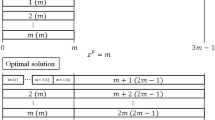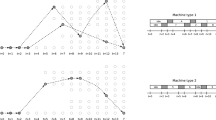Abstract
In scheduling with early work, jobs are assigned to a machine by maximizing the parts of non-preemptive jobs executed before their due dates. This paper considers a weighted early work maximization problem on parallel, identical machines with an antithetical property, which holds that \(w_i \le w_j\) implies \(d_i \ge d_j\) for any two jobs i and j where \(w_j\) and \(d_j\) are weight and due date of job j, respectively. We show that the problem is weakly NP-hard. Due to the high complexity of dynamic programming, we develop three solution approaches: mixed-integer programming, heuristics, and a branch-and-bound algorithm. Through numerical experiments, we verify their performance.
Similar content being viewed by others
Data Availability
The data used to support the findings of this study are available from the corresponding author upon request.
References
Abasian F, Ranjbar M, Salari M, Davari M, Khatami SM (2014) Minimizing the total weighted late work in scheduling of identical parallel processors with communication delays. Appl. Math. Modell. 38(15–16):3975–3986
Afzalirad M, Rezaeian J (2016) Design of high-performing hybrid meta-heuristics for unrelated parallel machine scheduling with machine eligibility and precedence constraints. Eng. Optim. 48(4):706–726
Ahuja RA, Mehlhorn K, Orlin JB (1990) Faster algorithm for the shortest path problem. J. Ass. Comput. Mach. 37:213–223
Baker KR (1984) Sequencing rules and due-date assignments in a job shop. Manag. Sci. 30(9):1093–1104
Blazewicz J (1984) Scheduling preemptible tasks on parallel processors with information loss. Tech. et Sci. Info. 3(6):415–420
Blazewicz J, Finke G (1987) Minimizing mean weighted execution time loss on identical and uniform processors. Info. Process. Lett. 24(4):259–263
Chen X, Liang Y, Sterna M, Wang W, Blazewicz J (2020) Fully polynomial time approximation scheme to maximize early work on parallel machines with common due date. European J. Oper. Res. 284(1):67–74
Chen X, Sterna M, Han X, Blazewicz J (2016) Scheduling on parallel identical machines with late work criterion: Offline and online cases. J. Sche. 19(6):729–736
Chen X, Wang W, Xie P, Zhang X, Sterna M, Blazewicz J (2020) Exact and heuristic algorithms for scheduling on two identical machines with early work maximization. Comput. & Ind. Eng. 144:106449
Choi B-C, Min Y, Kim KM, Park M-J (2021) A parallel machine scheduling problem maximizing total weighted early work. Asia-Pacific J. Oper. Res. 38(6):2150007
Chung Y, Park M-J (2015) Notes on inverse bin-packing problems. Info. Process. Lett. 115:60–68
Dereniowski D, Kubiak W (2018) Shared processor scheduling. J. Sched. 21(6):583–593
Gerstl E, Mosheiov G (2020) Single machine scheduling to maximize the number of on-time jobs with generalized due-dates. J. Sched. 23:289??99
Jiang Y, Guan L, Zhang K, Liu C, Cheng TCE, Ji M (2021) A note on scheduling on two identical machines with early work maximization. Comput Ind Eng 153:107091. https://doi.org/10.1016/j.cie.2020.107091
Leung J (2004) Minimizing total weighted error for imprecise computation tasks and related problems. In Handbook of scheduling: algorithms, models, and performance analysis (pp. 34.1–34.16). CRC Press
Sterna M (2011) A survey of scheduling problems with late work criteria. Omega 39:120–129
Sterna M (2021) Late and early work scheduling: A survey. Omega 104:102453
Sterna M, Czerniachowska K (2017) Polynomial time approximation scheme for two parallel machines scheduling with a common due date to maximize early work. J. Optim. Theory and Appl. 174(3):927–944
Wang W, Chen X, Musial J, Blazewicz J (2020) Two meta-heuristic algorithms for scheduling on unrelated machines with the late work criterion. Intern. J. Appl. Math. Comput. Sci. 30(3):573–584
Xu Z, Zou Y, Kong X (2015) Meta-heuristic algorithms for parallel identical machines scheduling problem with weighted late work criterion and common due date. SpringerPlus 4(1):1–13
Acknowledgements
The corresponding author’s work was supported by the Basic Science Research Program (2019R1G1A1085191) through the National Research Foundation of Korea (NRF).
Author information
Authors and Affiliations
Corresponding author
Ethics declarations
Conflicts of Interest
The authors declare that they have no conflicts of interest.
Additional information
Publisher's Note
Springer Nature remains neutral with regard to jurisdictional claims in published maps and institutional affiliations.
Rights and permissions
About this article
Cite this article
Min, Y., Choi, BC., Park, MJ. et al. A parallel-machine scheduling problem with an antithetical property to maximize total weighted early work. 4OR-Q J Oper Res 21, 421–437 (2023). https://doi.org/10.1007/s10288-022-00517-1
Received:
Revised:
Accepted:
Published:
Issue Date:
DOI: https://doi.org/10.1007/s10288-022-00517-1




